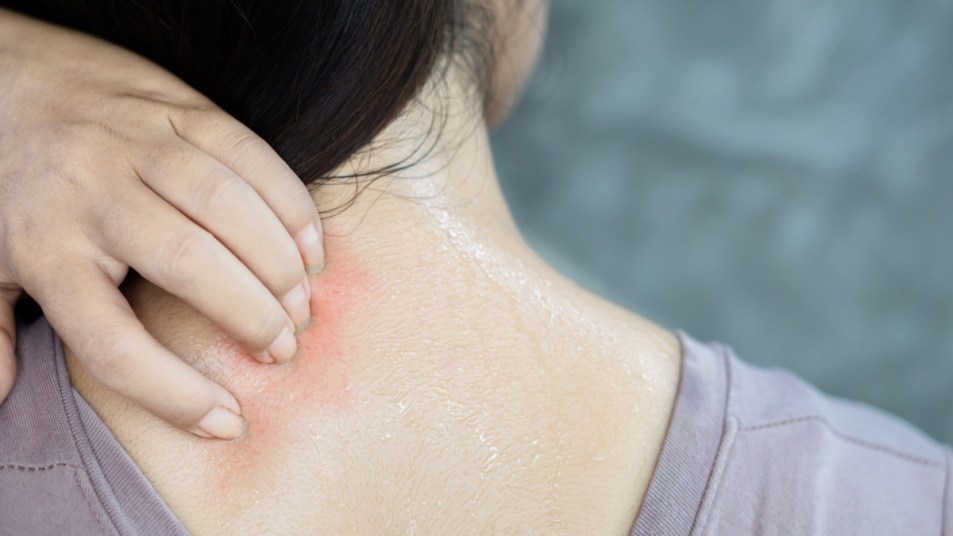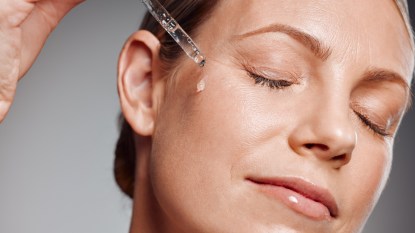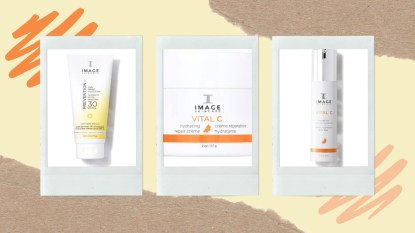Look for Products With This Inexpensive Ingredient to Best Treat Psoriasis and Dry Skin

Finding good skincare for psoriasis is challenging, to say the least. Psorasis is a common skin ailment that doesn’t have an exact cause, which makes it difficult to treat. Itchy, cracked, and scaly skin can become even more inflamed from the wrong ingredients. And with the cold weather dropping in, symptoms could get even worse. Fortunately, new research shows that glycerin — a well-established, soothing skincare ingredient — can improve psoriasis symptoms. The best part is that it’s inexpensive, too.
A study published in the International Journal of Molecular Sciences found that glycerol, more commonly known as glycerin, effectively treats psoriasis. (Glycerin is the commercial name for concentrated and purified glycerol.) Though psoriasis has no cure because it results from an overactive immune system, the research showed that glycerin helps skin cells function normally.
Glycerin’s Effect on Psoriasis
To better understand how glycerin improves psoriasis symptoms, the research team analyzed its effects in mice. Mice with psoriasis received either topical or oral glycerin. The first group of mice received topical treatments of equal parts glycerin and water every day for five days. With time, researchers noticed that those mice had less redness, thickening, and scaling on their skin in comparison to a control group.
Another group of mice received 2 percent glycerin in their drinking water for five days. Again, the research team saw that those mice had less skin inflammation. Their skin was also less thick with psoriasis buildup as compared to a control group. However, oral glycerin did not improve very tiny lesions in the skin, which the psoriasis had caused.
Why did glycerin work so well topically? According to the researchers, glycerin changes into a fat when it enters skin cells. That fat helps keratinocytes, or the main cells in our top skin layer, function normally. This in turn reduces inflammation.
Anthony Rossi, MD, a board-certified dermatologist at Memorial Sloan Kettering Cancer Center, says that glycerin also helps retain moisture. “Since it attracts water, it is really helpful for inflammatory skin conditions where the inflammation causes trans epidermal water loss,” Dr. Rossi tells Woman’s World. “Therefore, eczema and psoriasis may benefit from the emollient and water binding properties of glycerin.” Dr. Rossi notes that glycerin also has antimicrobial properties which may protect the skin from bacteria.
How to Use Glycerin in Skincare for Psoriasis
When it comes to skincare for psoriasis, glycerin may be a very effective ingredient. However, the researchers cautioned that it may not be for everyone, and it is important to use in conjunction with other treatments. Still, they noted that the ingredient has very few side effects, if any.
Dr. Hadley King, MD, a board-certified dermatologist and Clinical Instructor of Dermatology at the Weill Medical College of Cornell University, believes that glycerin is most effective in a complete moisturizer.
“Moisturizers ideally contain three components: humectants, emollients, and occlusives,” she says. “It’s important to look for a product that contains all three components! Humectants, like hyaluronic acid and glycerin, are mostly low molecular weight substances that bind water into the stratum corneum [the outermost layer of the skin].”
According to Dr. King, these three components together help the skin retain water. Emollients are saturated and unsaturated softeners that improve the skin barrier, texture, and appearance. Occlusives are oils and waxes that physically block water from leaving the skin. All three components should help you achieve healthy skin and reduce psoriasis symptoms.
“Because psoriatic skin lesions are often itchy, a nice option is Sarna Eczema Relief Whipped Foam,” says Dr. King (Buy on Amazon, $14.99). “Its formulation includes hydrocortisone 1 percent to help soothe inflammation, as well as moisturizing ingredients: humectants like glycerin, emollients like stearic acid and occlusives like petrolatum, the perfect combination to hydrate, support the skin barrier, and lock in moisture.”
No matter what psoriasis product you use, try your best to avoid certain irritants, like fragrance. “Patients with psoriasis should avoid ingredients like fragrances, dyes, or other know irritants since the skin is already inflamed,” Dr. Rossi explains. “It is really important for persons with psoriasis to avoid trauma or irritation because these can trigger further psoriatic lesions.”
How to Use Glycerin for Psoriasis and All Skin Types
Glycerin is also an excellent ingredient for nearly every skin type, especially with cold weather approaching. But what’s the best way to apply a lotion with glycerin? According to Dr. Rossi, you should first wash your skin but leave it wet.
“After washing the skin you shouldn’t dry all the moisture off of it,” he says. “Actually, you should just pat it dry and apply the product with glycerin onto the damp skin. This well help seal the water onto this skin, which is what we want in compromised skin barriers or inflamed skin. Topical glycerin is really helping to sustain the skins barrier function and thus why it is helpful in psoriatic lesions.”
If you’re doing your evening skincare routine, don’t do it right before bed, either. Otherwise, your pillowcase and sheets will absorb your skin products. Try to wait at least half an hour after your skincare routine before resting your head on your pillow. With these changes to your routine, you should be on your way to smooth, glowing skin.













